Running a business without structure is like trying to build a skyscraper on sand—unstable, unpredictable, and bound to collapse.
If your operations feel disconnected, reporting feels like a nightmare, and managing departments drains your energy,
it’s time you discovered the game-changer: ERP solutions.
Welcome to the world of Enterprise Resource Planning (ERP)—where business meets intelligence, and chaos gives way to clarity.
This blog will walk you through what ERP is, why it matters, how it works, and why every modern business owner should care.
By the end, you’ll understand how ERP software for business can be your ultimate growth partner.
What Is ERP?
Enterprise Resource Planning (ERP) is an integrated software system that helps businesses manage their core functions from a centralized platform.
This includes finance, HR, inventory, procurement, sales, marketing, operations, and more.
Instead of using multiple disconnected tools or drowning in Excel sheets, an ERP solution brings everything under one digital roof.
It connects your departments, unifies data, and empowers smarter, faster decisions.
In short: ERP turns fragmented business chaos into streamlined efficiency.

The Core Functions of ERP Software
A complete ERP software for business typically includes:
- Finance and Accounting – Manage invoicing, payments, budgeting, payroll, and cash flows.
- Inventory Management – Monitor stock levels, automate reorders, and minimize holding costs.
- Procurement – Track supplier performance, purchase orders, and billing cycles.
- Human Resources – Handle recruitment, employee management, attendance, and payroll.
- Sales and Customer Service – Maintain sales pipelines, leads, customer data, and support systems.
- Production and Manufacturing (for relevant industries) – Plan resources, manage bills of materials, and track production lifecycles.
These modules talk to each other, giving you a fully integrated business management system that minimizes manual work and maximizes results.
Why Every Business Owner Needs ERP
If you’re asking, “Is ERP right for my business?”—the answer is most likely YES.
Let’s break down the key benefits of ERP solutions for modern companies:
-
Real-Time Visibility
With ERP, all your business data is accessible in one dashboard. Whether it’s inventory levels, customer invoices, or employee attendance—you get real-time insights to make better decisions.
-
Business Automation
ERP automates daily tasks—generating reports, sending invoices, calculating payroll, reordering supplies—saving time and reducing human error.
-
Improved Collaboration
When departments work on the same system, communication flows better. ERP breaks silos and enables cross-functional teamwork.
-
Cost Reduction
ERP helps you reduce waste, lower labor costs, optimize inventory, and avoid revenue leaks. Over time, it pays for itself.
-
Scalability
Whether you're onboarding 10 or 1000 new customers, ERP scales effortlessly. No more system crashes or duplicate data entries.
What Happens Without ERP?
Here’s what your business might look like without an ERP system:
- Data is scattered across tools and emails.
- Team members duplicate work unknowingly.
- Reports are inconsistent and outdated.
- Customer service suffers due to a lack of visibility.
- Business growth feels overwhelming.
Without enterprise resource planning, your business may survive—
but it won’t thrive.
Who Can Use ERP?
It’s a myth that only large enterprises need ERP. Thanks to cloud ERP systems, startups, small businesses, and mid-sized companies can affordably use ERP too.
Whether you’re in retail, manufacturing, education, healthcare, e-commerce, or services—ERP is adaptable to your industry and needs.
If you handle:
...then you’re ready for ERP.
Types of ERP Systems
Choosing the right ERP depends on your business model. Here are the common types:
-
On-Premise ERP
Installed on your local servers. Offers full control and customization but needs significant IT infrastructure.
-
Cloud ERP
Hosted online and accessed via the internet. It’s scalable, secure, and doesn’t require in-house IT teams. Ideal for growing businesses.
-
Hybrid ERP
Combines both on-premise and cloud models for flexibility. Suitable for organizations transitioning to the cloud.
Most modern businesses today prefer cloud ERP for its lower costs, faster deployment, and mobile access.
How ERP Works: Step-by-Step
Here’s how a typical ERP implementation works:
- Assessment – Identify your business needs, pain points, and goals.
- Planning – Define the modules required and plan integration with existing tools.
- Data Migration – Move your existing data into the ERP system.
- Configuration & Customization – Tailor the system to fit your workflow.
- Training – Teach your staff how to use the system efficiently.
- Testing & Go Live – Validate the system and go live with full support.
- Ongoing Support & Updates – Keep improving with updates and feedback.
The right ERP vendor will walk with you through every step.
With ERP vs. Without ERP (Word Format)
Here’s how your business operations compare:
-
Data Access:
With ERP, your data is centralized and accessible in real-time. Without ERP, data is scattered and often delayed.
-
Accuracy:
ERP reduces human error through automation. Without it, manual processes often lead to mistakes.
-
Scalability:
ERP scales as your business grows. Without ERP, scaling means adding more disconnected tools.
-
Collaboration:
ERP enables departments to collaborate seamlessly. Without ERP, communication gaps cause confusion.
-
Decision-Making:
ERP provides real-time analytics and forecasting. Without ERP, decisions rely on guesswork.
-
Reporting:
ERP creates instant reports and dashboards. Without it, reporting is time-consuming and inconsistent.
How to Choose the Right ERP Solution
Not all ERP systems are created equal. Here's what you should look for:
- Industry Fit: Choose an ERP that understands your industry’s unique challenges and workflows.
- User-Friendly Interface: Your team should enjoy using it. The simpler, the better.
- Customizability: Ensure it adapts to your processes instead of forcing you to change everything.
- Integration Capabilities: It should work with your existing tools (CRM, POS, etc.).
- Scalable Pricing: Start small and upgrade as you grow. Cloud ERPs offer great flexibility here.
Why ERP Is a Competitive Advantage
In today’s competitive world, having ERP gives you:
- Operational Clarity – Know what’s happening, where, and why.
- Speed – Get things done faster with automation.
- Trust – Your team can rely on data, not assumptions.
- Customer Satisfaction – Quicker responses and better service.
- Growth Control – Expand without chaos.
ERP solutions make your business smarter, faster, and more efficient.
You’ll stop reacting and start anticipating.

ERP + Business Automation = Future-Ready
ERP is not just about software—it’s about future-proofing your company.
When combined with business automation, it helps you:
- Monitor KPIs in real-time
This isn’t just transformation—it’s elevation.
Final Thoughts: It’s Time to Think ERP
You don’t have to run your business on spreadsheets and stress anymore.
If you want to:
- Streamline your operations
- Improve customer satisfaction
- Prepare for scalable growth
...then ERP is the solution you’ve been searching for.
ERP is not a cost. It’s an investment in growth, control, and peace of mind.
So, are you ready to explore the perfect ERP software for your business?
Let’s build smarter, better, and stronger—together.
Powered by KSoft Technologies
At KSoft Technologies, we deliver custom ERP solutions tailored to your business goals.
Our team combines industry expertise with smart automation to help you take control, cut costs, and scale sustainably.
Your ERP journey starts here. Let’s talk.


